|
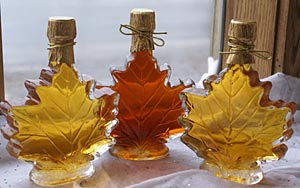
Adirondack Maple Syrup .com is the premier online
guide to maple syrup and maple products in
the
Adirondacks and Upstate
New York.
A taste of the Adirondacks!
|
The
Story Behind
Pure Adirondack Maple Syrup
There
is no better place in the world to harvest pure maple syrup
than the Adirondacks!
Due to a remarkable combination of very cold nights and warm
spring days, as well as the very high altitude of the Adirondack
Mountains,
the sugar maples that thrive in this 6 million acre Adirondack
Park produce a sugary sap that flows like liquid gold.
As soon as the early spring thaw arrives in the Adirondack
mountains - sometime in late February or March the sugar maple's
sap begins to flow in earnest.
It actually takes over 40 gallons of this sugary sap to boil
down into one concentrated gallon of Pure Adirondack Maple
Syrup.
A beautiful amber gold liquid that is so delicate and flavorful,
its like tasting nature itself!
We
invite you to sample this wonderful gift from nature...
Pure Adirondack Maple Syrup
|
|
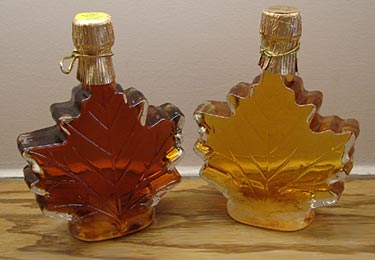
Pure Adirondack
Maple Syrup
|
THE
ADIRONDACK SUGAR MAPLE
Sugar maple is
the state tree of New York and commonly found throughout the Adirondacks.
In addition to its use for syrup production, sugar maple is a valuable
tree for lumber and is used extensively in fine furniture. It provides
spectacular fall color and has been widely planted as a shade and
ornamental tree.
Buy
maple syrup today!

|
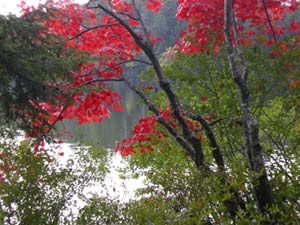 TAPPING
THE TREE TAPPING
THE TREE
To
obtain the earliest runs of sap, tapping should be completed by
the middle of February . Minimal trunk diameter for trees suitable
for tapping is 10 inches at 4 feet above the ground. To tap a tree,
select a spot on the trunk of the tree 2 to 4 feet above the ground
in an area that appears to contain sound wood. At this point, drill
a hole approximately 1 to 1.5 inches deep into the wood. Then insert
a collection spout and tap lightly into the tree, and attach a bucket
or plastic bag or a tubing line to the spout.
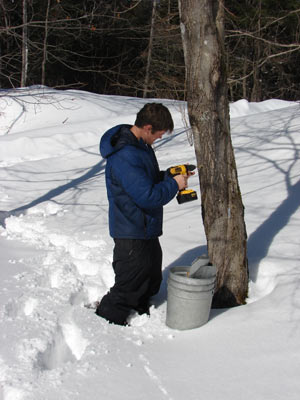 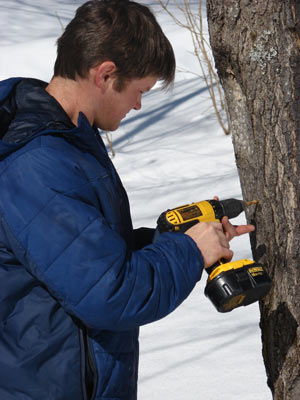
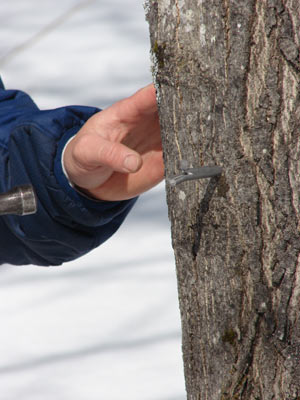 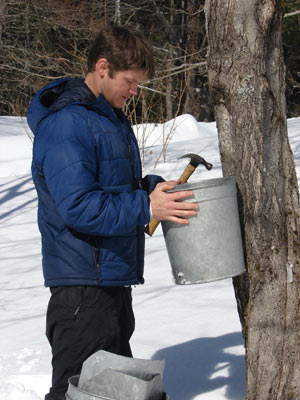
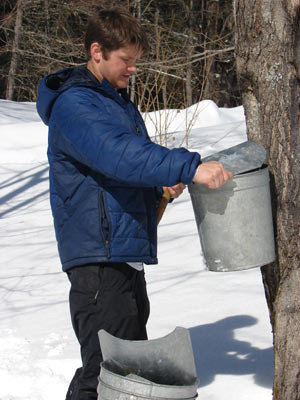
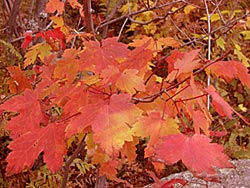 DIFFERENT
GRADES OF USDA MAPLE SYRUP DIFFERENT
GRADES OF USDA MAPLE SYRUP
The 100% pure maple syrup grades are based on three different factors
- the color, flavor and density. The different grades of syrup do
not indicate a difference in the quality or the purity of the maple
syrup. The darker the color of the syrup, the stronger and richer
the maple flavor. The lighter syrups are from the earlier sap runs,
have a milder maple flavor and go well with deserts or cereals.
A darker amber has a richer maple flavor and is perfect for waffles
or pancakes. All maple grades are of the same density. Pure USDA
maple syrup is organic, vegan friendly, and is produced with modern,
sustainable techniques and forest management practices.
 Different
grades of Adirondack maple syrup
Different
grades of Adirondack maple syrup |
COLLECTING
THE SAP
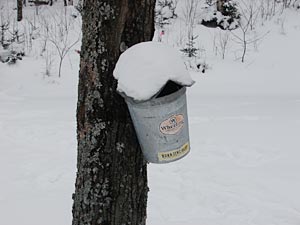 Sap
flow in maple trees will not occur every day throughout the tapping
season, only when a rapid warming trend in early to midmorning follows
a cool (below freezing) night. Thus, the amount of sap produced
varies from day to day. Normally, a single tap-hole produces from
a quart to a gallon of sap per flow period (from a few hours to
a day or more), with a seasonal accumulation of 10 to 12 gallons
per tap-hole likely. Sap
flow in maple trees will not occur every day throughout the tapping
season, only when a rapid warming trend in early to midmorning follows
a cool (below freezing) night. Thus, the amount of sap produced
varies from day to day. Normally, a single tap-hole produces from
a quart to a gallon of sap per flow period (from a few hours to
a day or more), with a seasonal accumulation of 10 to 12 gallons
per tap-hole likely.
Producing maple
syrup is essentially a matter of concentrating the sugar solution
to a predetermined level through evaporation. Heat is used to concentrate
the sap and to develop the characteristic maple color and flavor
that make maple syrup so highly desirable.
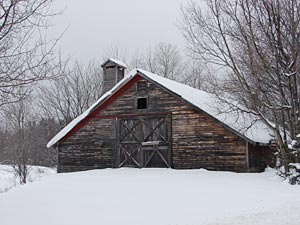 To
begin evaporation, fill the evaporating container (preferably a
large shallow pan) with sap. Begin heating the sap to the boiling
point, taking care not to burn or scorch the sap. (A Teflon-coated
pan is ideal.) As evaporation lowers the level of sap in the pan,
add more sap. Continue this process until most of the sap in the
pan is highly concentrated and the boiling point of the sap begins
to rise above the boiling point of water. To
begin evaporation, fill the evaporating container (preferably a
large shallow pan) with sap. Begin heating the sap to the boiling
point, taking care not to burn or scorch the sap. (A Teflon-coated
pan is ideal.) As evaporation lowers the level of sap in the pan,
add more sap. Continue this process until most of the sap in the
pan is highly concentrated and the boiling point of the sap begins
to rise above the boiling point of water.
Throughout this process, it may be necessary occasionally to skim
the surface of the boiling liquid to remove surface foam and other
materials. Finished syrup boils at 7 degrees above the boiling point
of water. As the temperature of the boiling sap approaches this
point, boiling should be carefully controlled to prevent burning
and overheating.
Once the desired boiling point has been reached, the syrup is ready
for filtering and packaging.
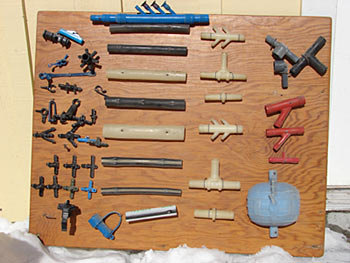
Different types of taps for
maple syrup production |
During warm periods when temperatures rise above freezing, pressure
develops in the tree. This pressure causes the sap to flow out of
the tree through a wound or tap hole. During cooler periods when
temperatures fall below freezing, suction develops, drawing water
into the tree. This replenishes the sap in the tree, allowing it
to flow again during the next warm period. Sap flows through a portion
of the outer tree trunk called sapwood. Sapwood consists of actively
growing cells that conduct water and nutrients (sap) from the roots
to the branches of the tree. During the day, activity in the cells
of sapwood produces carbon dioxide. This carbon dioxide is released
to the intercellular spaces in the sapwood. In addition, carbon
dioxide that was dissolved in the cool sap is 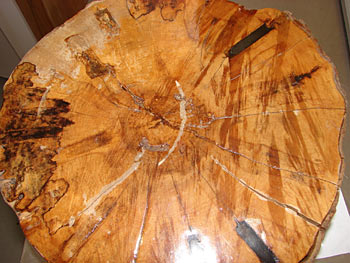 released
into the spaces between the cells. Both of these sources of carbon
dioxide cause pressure to build up in the cells. A third source
of pressure is called osmotic pressure, which is caused by the presence
of sugar and other substances dissolved in the sap. released
into the spaces between the cells. Both of these sources of carbon
dioxide cause pressure to build up in the cells. A third source
of pressure is called osmotic pressure, which is caused by the presence
of sugar and other substances dissolved in the sap.
When the tree is wounded, as when it is tapped by a maple producer,
the pressure forces the sap out of the tree. At night or during
other times when temperatures go below freezing, the carbon dioxide
cools and therefore contracts. Some of the carbon dioxide also becomes
dissolved in the cooled sap. Finally, some of the sap freezes. All
three of these factors create suction in the tree. This causes water
from the soil to be drawn up into the roots and travel up through
the sapwood. When temperatures rise above freezing the next day,
sap flow begins again.

Pure Adirondack
Maple Syrup Makes a Wonderful Gift!
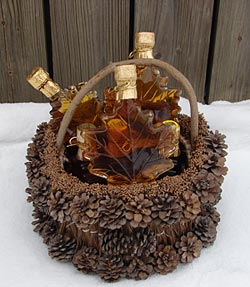 Maple
syrup may be used as is, of course, or it may be converted into
other highly desirable products. Maple sugar, maple candy and maple
fudge are just a few of the many other maple products. Basically,
these are made by concentrating finished syrup to a greater density
and stirring the highly concentrated syrup. Maple
syrup may be used as is, of course, or it may be converted into
other highly desirable products. Maple sugar, maple candy and maple
fudge are just a few of the many other maple products. Basically,
these are made by concentrating finished syrup to a greater density
and stirring the highly concentrated syrup.
Maple syrup and sugar are among the oldest agricultural commodities
produced in the United States. Native Americans are generally credited
with discovering how to convert maple sap into maple syrup. The
importance of maple products for local trade was established well
before the arrival of the first European settlers in North America.
Maple syrup production is confined to the northeastern portion of
the United States, with the largest amounts produced in Vermont
and New York. Until rather recently, maple syrup and sugar have
been strictly a "sideline" farm crop; however, the production
of maple syrup and other maple products is often a full-time operation.
click here to learn more about maple
syrup production
See a wide selection of Maple Candies and Gifts for all seasons!
Maple
Sugar Candy

|
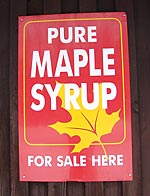 New
York State is one of the leading Maple syrup producers New
York State is one of the leading Maple syrup producers
New
York is one of America's leading maple producing states. Upwards
of 350,000 gallons of maple syrup is produced in New York each year.
The Adirondacks located in Upstate New York is famous for producing
some of the finest, full-bodied maple syrup in the country. A delicious,
sweet, golden syrup distilled from the clear sap of the Adirondack
sugar maples that flourish throughout the 6 million acre Adirondack
Park.
See why people love our Pure Adirondack Maple Syrup!
 "The
golden color and delicate sweetness of your Light Amber syrup is
like silk...absolutely delicious"! "The
golden color and delicate sweetness of your Light Amber syrup is
like silk...absolutely delicious"!
"I've never
tasted anything so wonderful"!
"The Dark
Amber maple syrup is so rich and so maplely tasting"!
"This maple
syrup makes me feel like I'm in the mountains of the Adirondacks"!
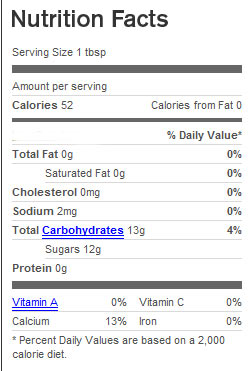 Nutritional
Facts on
Nutritional
Facts on
Pure Adirondack Maple Syrup |
History
of the Adirondack Great Camps
A brief history of the Adirondacks from the first sighting by a
European in 1535,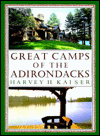 through the eras of trapping, iron mining, and lumbering, to the
development of railroad and steamboat lines that led to the influx
of tourists and building of the "Great Camps".
through the eras of trapping, iron mining, and lumbering, to the
development of railroad and steamboat lines that led to the influx
of tourists and building of the "Great Camps".
The sixty years from 1870 to 1930 were the heyday of these camps,
the "Guilded Age" of the Adirondacks. Kaiser gives a fascinating
account both of the personalities who engineered and financed these
fabulous structures and of the bulidings themselves.
Click here to visit our photo gallery
of vintage Adirondack Great Camps
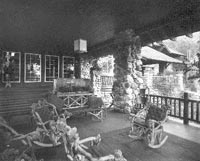
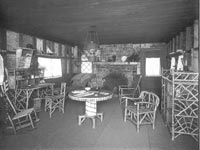 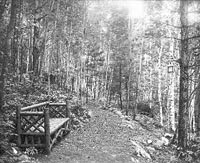
Click
here to visit the ADIRONDACK
FURNITURE GALLERY
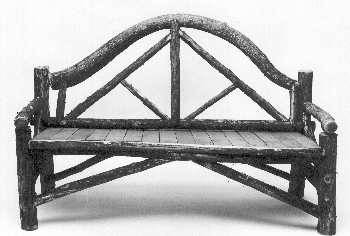
The
46 High Peaks in the Adirondacks
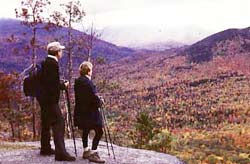 |
|
Airondack
Hikers
Photo
courtesy of Jim Grant
|
The
High Peaks Region is famous for its magnificant 46 peaks including
Mt. Marcy, the highest peak in New york State, with an elevation
of 5344' .The 46 peaks include the following mountains (listed in
order of height):
Mt. Marcy, Algonquin Peak, Mt. Haystack, Mt. Skylight, Whiteface
Mtn,Dix Mtn. , Gray Peak, Iroquois Peak , Basin Mtn., Gothics, Mt.
Colden, Giant Mtn., Nippletop, Santanoni Peak, Mt. Redfield, Wright
Peak, Saddleback Mtn., Panther Peak, Tabletop Mtn., Rocky Peak Ridge,
Macomb Mtn., Armstrong Mtn. ,Hough Peak, Seward Mtn., Mt. Marshall,
Allen Mtn., Big Slide Mtn., Esther Mtn. , Upper Wolfjaw, Lower Wolfjaw
, Street Mtn., Phelps Mtn., Mt. Donaldson, Seymour Mtn., Sawteeth,
Cascade Mtn., South Dix, Porter Mtn., Mt. Colvin, Mt. Emmons, Dial
Mtn., East Dix, Blake, Cliff Mtn., Nye Mtn., and Couchsachraga Peak.
for more information on the 46 high peaks in the Adirondacks please
visit our sister site - 46
High Peaks .com
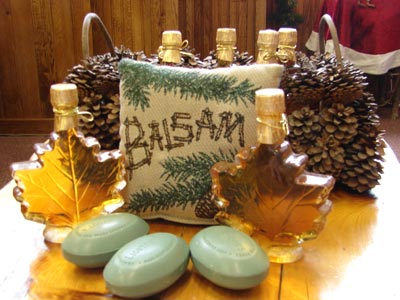
We
invite you to visit our Adirondack
Gallery showcasing unique Adirondack
Furniture
~ Antler Chandeliers & Lamps ~ Hand
Painted Canoe Paddles ~ Adirondack
Packbaskets ~ Adirondack Prints ~ Authentic Birch Bark Framing
~
and
beautiful hand crafted gifts. Click
here!
We also offer
interior design services for Adirondack
style camps & homes.
|
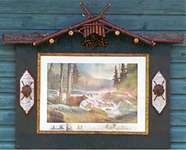
Birchbark Picture Frames |
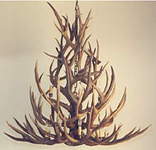
Antler Chandeliers |
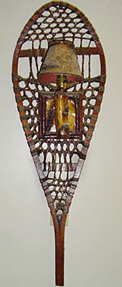
Snowshoe Lamps |
 Hand Painted Canoe
Paddles
Hand Painted Canoe
Paddles |

Adirondack
Maple Syrup .com
43 Broadway
Saranac Lake, NY
Phone: 518-891-3745 Fax: 518-891-3768
E-Mail: RobGrant@northnet.org
This website is owned and operated by
adirondacks.com internet publishing
group.
For advertising and editorial content,
please contact Rob Grant;
adirondacks.com reserves the right to reject,
modify or cancel any advertising
at its sole discretion.
webmaster:
Susan Moore
All copy & images copyright- Adirondacks.com Internet Publishing
Group
|

 through the eras of trapping, iron mining, and lumbering, to the
development of railroad and steamboat lines that led to the influx
of tourists and building of the "Great Camps".
through the eras of trapping, iron mining, and lumbering, to the
development of railroad and steamboat lines that led to the influx
of tourists and building of the "Great Camps". 





 TAPPING
THE TREE
TAPPING
THE TREE




 DIFFERENT
GRADES OF USDA MAPLE SYRUP
DIFFERENT
GRADES OF USDA MAPLE SYRUP
 Sap
flow in maple trees will not occur every day throughout the tapping
season, only when a rapid warming trend in early to midmorning follows
a cool (below freezing) night. Thus, the amount of sap produced
varies from day to day. Normally, a single tap-hole produces from
a quart to a gallon of sap per flow period (from a few hours to
a day or more), with a seasonal accumulation of 10 to 12 gallons
per tap-hole likely.
Sap
flow in maple trees will not occur every day throughout the tapping
season, only when a rapid warming trend in early to midmorning follows
a cool (below freezing) night. Thus, the amount of sap produced
varies from day to day. Normally, a single tap-hole produces from
a quart to a gallon of sap per flow period (from a few hours to
a day or more), with a seasonal accumulation of 10 to 12 gallons
per tap-hole likely.
 To
begin evaporation, fill the evaporating container (preferably a
large shallow pan) with sap. Begin heating the sap to the boiling
point, taking care not to burn or scorch the sap. (A Teflon-coated
pan is ideal.) As evaporation lowers the level of sap in the pan,
add more sap. Continue this process until most of the sap in the
pan is highly concentrated and the boiling point of the sap begins
to rise above the boiling point of water.
To
begin evaporation, fill the evaporating container (preferably a
large shallow pan) with sap. Begin heating the sap to the boiling
point, taking care not to burn or scorch the sap. (A Teflon-coated
pan is ideal.) As evaporation lowers the level of sap in the pan,
add more sap. Continue this process until most of the sap in the
pan is highly concentrated and the boiling point of the sap begins
to rise above the boiling point of water.
 released
into the spaces between the cells. Both of these sources of carbon
dioxide cause pressure to build up in the cells. A third source
of pressure is called osmotic pressure, which is caused by the presence
of sugar and other substances dissolved in the sap.
released
into the spaces between the cells. Both of these sources of carbon
dioxide cause pressure to build up in the cells. A third source
of pressure is called osmotic pressure, which is caused by the presence
of sugar and other substances dissolved in the sap. 
 Maple
syrup may be used as is, of course, or it may be converted into
other highly desirable products. Maple sugar, maple candy and maple
fudge are just a few of the many other maple products. Basically,
these are made by concentrating finished syrup to a greater density
and stirring the highly concentrated syrup.
Maple
syrup may be used as is, of course, or it may be converted into
other highly desirable products. Maple sugar, maple candy and maple
fudge are just a few of the many other maple products. Basically,
these are made by concentrating finished syrup to a greater density
and stirring the highly concentrated syrup. 
 New
York State is one of the leading Maple syrup producers
New
York State is one of the leading Maple syrup producers "The
golden color and delicate sweetness of your Light Amber syrup is
like silk...absolutely delicious"!
"The
golden color and delicate sweetness of your Light Amber syrup is
like silk...absolutely delicious"!






